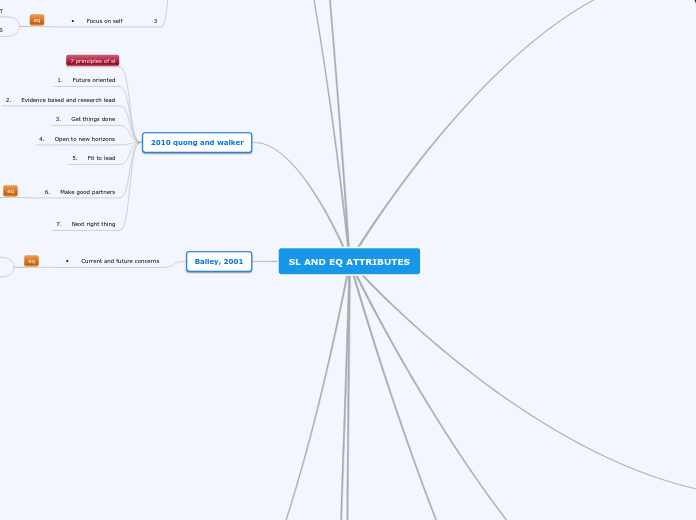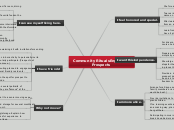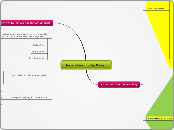SITUATION SENSING
concerns the skill or adeptness at inducing desirable responses in others.
refers to how people handle relationships and awareness of others’ feelings, needs, and concerns.
refers to managing ones’ internal states, impulses, and resources.
concerns knowing one’s internal states, preferences, resources, and intuitions.
Floating topic
EQ
GOLEMAN (2015)
http://www.danielgoleman.info/daniel-goleman-how-emotionally-intelligent-are-you/
COMPETENCY
4 AREAS OF PERSONAL ABILITY
relationship management
Teamwork & Collaboration: Working with others toward shared goals. Creating group synergy in pursuing collective goals.
Conflict Management: Negotiating and resolving disagreements.
Influence: Wielding effective tactics for persuasion.
Change Catalyst: Initiating or managing change.
Inspirational Leadership: Inspiring and guiding individuals and groups.
Developing Others: Sensing others’ development needs and bolstering their abilities.
concerns the skill or adeptness at inducing desirable responses in others. The Relationship Management cluster contains six competencies:
empathy and social awareness
Service Orientation: Anticipating, recognizing, and meeting customers’ needs.
Organizational Awareness: Reading a group’s emotional currents and power relationships.
Empathy: Sensing others’ feelings and perspectives, and taking an active interest in their concerns.
refers to how people handle relationships and awareness of others’ feelings, needs, and concerns. The Social Awareness cluster contains three competencies:
self-management
Optimism: Persistence in pursuing goals despite obstacles and setbacks.
Initiative: Readiness to act on opportunities.
Achievement: Striving to improve or meeting a standard of excellence.
Adaptability: Flexibility in handling change.
Transparency: Maintaining integrity, acting congruently with one’s values.
Emotional Self-Control: Keeping disruptive emotions and impulses in check.
refers to managing ones’ internal states, impulses, and resources. The Self-Management cluster contains six competencies:
self-awareness
Self-Confidence: A strong sense of one’s self-worth and capabilities.
Accurate Self-Assessment: Knowing one’s strengths and limits.
Emotional Awareness: Recognizing one’s emotions and their effects.
concerns knowing one’s internal states, preferences, resources, and intuitions. The Self-Awareness cluster contains three competencies:
3 MODLES
COMPETENCY-BASED
GOLEMAN 2000
NON-COGNITIVE
BAR-ON 1997
ABILITY
MAYER AND SALOVEY 1997
SL AND EQ ATTRIBUTES
(Adair, 2010, I.B.Essien, 2012, Stowell and Mead, 2016)
communication skills
SELF MANAGEMENT
Wong el al 2003
Do – action and influencing
• Practice strategic art
• Build teams
• Mentor and teach
• Shape culture
• Visionary
Know – skills
• Understands culture, politics, economics, logistics
• Technical – system understanding IT
• Interpersonal – inspiring, coordinates,
• Conceptual – proactive/reflective/thinker
Be (value and attributes)
• High intellectual
• Skilled diplomat
• Stress management
• Fit mentally and physically
• Deal with complexity
Kumar, 2014
Transformation leadership
• Good rapport between leader and follower
• Morale of followers
• Values
• Understand the needs
Bailey, 2001
• Current and future concerns
2010 quong and walker
7. Next right thing
6. Make good partners
5. Fit to lead
4. Open to new horizons
3. Get things done
2. Evidence based and research lead
1. Future oriented
7 principles of sl
Leithch 2016
3
• Focus on self
2
• Training
• Hiring
• Assessment
1
• Innovation
• Transparency
• Decision making
8. Reflect
7. Leadership development
6. Safe to fail
5. Hire for transformation
4. Experience based learning
3. Safe to fail
2. Honest and open
1. Distribute responsibility
10 principles of SL
attributes of SL
SL – combine both human and non-human side
Resource management skills
Good decision maker
Builds relationship with followers
UPPER ECHELON THEORY
LEADERSHIP STYLE
GROUP CHARACTERISTICS
FINANCIAL POSITION
SOCIO-ECONOMIC ROOTS
EDUCATION
OTHER CAREER EXPERIENCES
FUNCTIONAL TRACK
AGE
(Hambrick & Mason, 1984)
visonary leadership
Optimistic
Magnetic
Bold
Collaborative
Persistent
Resolute
Imaginative
Open Minded
Emotionally Intelligent
Inspirational
Transactional leadership
Emphasis on self-interest
Emphasis on corporate structure
Directive
Passive
Constrained thinking
Rewards performance
Discourage independent thinking
Resistant to change
Practicality
Extrinsic motivation
TRANSFORMATIONAL LEADERSHIP
Humility
listen
learn
An Understanding of Interdependence
The Ability to Collaborate
change
systematic
social
cultural
empower
mobalise
develop
Authenticity
Self-awareness
Visionary
Willing to listen and entertain new ideas
Organizational consciousness
make decisions that will create growth
spur innovation
evoke change
Individualized Consideration
Intellectual Stimulation
Idealized/Charismatic influence
follow up
sets company targets
courage
SELF AWARENESS
leads with vision
ENTERTAINS NEW IDEA
Adaptability
Make difficult decisions
TAKE right RISK
Keep their ego in check
Self-management
PROACTIVE
SELF-MANAGEMENT
HAS CLEAR VISION
KNOWS THE FOLLOWERS
EMPATHY & SOCIAL AWARENESS
INSPIRE
MOTIVATE
eq
RELATIONSHIP MANAGEMENT









